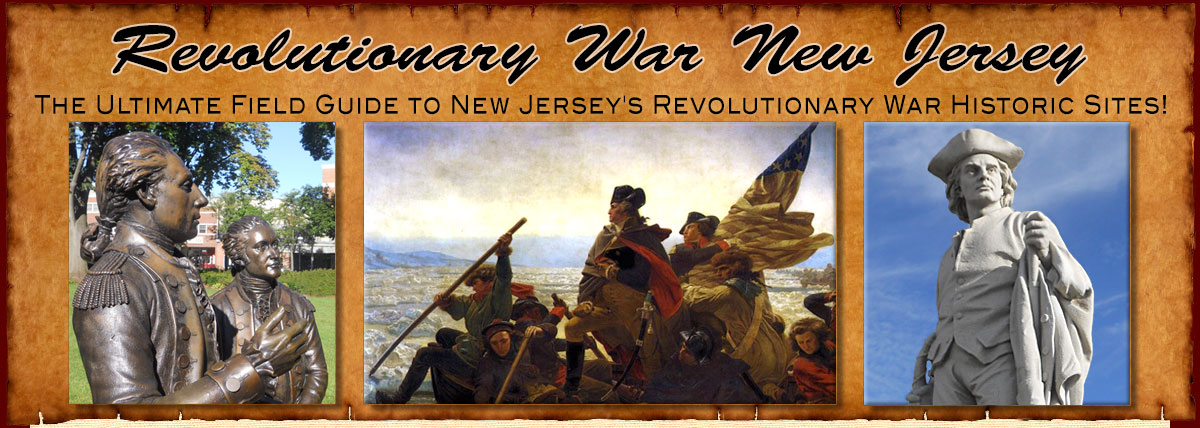

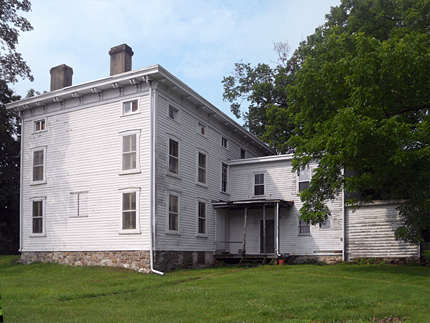
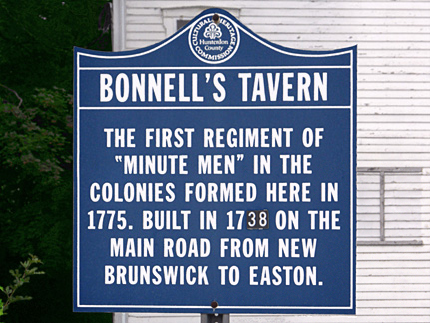
Bonnell's Tavern
Pittstown Rd., next to Rte. 78
Map / Directions to Bonnell's Tavern
Map / Direction to all Clinton Revolutionary War Sites
Bonnell's Tavern is not currently open to the public.
Henry Bonnell, a direct descendant of Abraham Bonnell, is currently working
on plans for a project to restore and open the building.
For more information, see the Bonnell Tavern website and this April 12, 2016 article by Sallie Graziano.
Bonnell's Tavern
Operated in the Revolutionary War era by Abraham Bonnell
Abraham Bonnell was an active figure both politically and militarily throughout the Revolutionary War era. His political involvement in the American cause actually began a decade before the Revolutionary War, when he was a member of the Sons of Liberty.
In 1765, ten years before the beginning of the Revolutionary War, the British Parliament passed the Stamp Act, which imposed a tax on a wide range of paper items in the thirteen British colonies in America. The Stamp Act was very unpopular throughout the colonies. Groups calling themselves the Sons of Liberty formed to protest the Stamp Act and defend the rights of the colonists. Bonnell was a member of a Hunterdon County group of the Sons of Liberty which formed in 1766. [1] The Stamp Act was soon repealed by the British Parliament, but the tensions which it had caused would continue to grow and would eventually lead to the beginning of the Revolutionary War.
Abraham Bonnell moved into this house and began operating it as a tavern in 1767, [2] two years after his involvement with the Sons of Liberty. In the following years, Bonnell's tavern remained a gathering place for local meetings and politics, as did other taverns of the time. [3] Bonnell remained a prominent man of the community throughout these years.
The Revolutionary War began on April 19, 1775 with the Battles of Lexington and Concord in Massachusetts. Several months later, Abraham Bonnell served as a delegate from Hunterdon County at an August 1775 session of the Provincial Congress of New Jersey. [4] The Provincial Congress was a transitional governing body during the period at the beginning of the war when New Jersey made the transition from a British colony to one of the independent United States of America.
During that August 1775 session, the Provincial Congress of New Jersey passed a bill which called for the creation of sixty-two militia companies of minutemen. The term minutemen name derived from the fact that they were intended as mobile militia forces that could deploy quickly "at a minute's notice." Each New Jersey county was allotted a specific number of minutemen companies, each comprised of sixty-four men; Hunterdon was allotted eight companies. [5]
Shortly afterwards, Colonel Charles Stewart called a meeting at Bonnell's Tavern and raised a regiment of minutemen.[6] Although the historic sign at the house states "the first regiment of 'Minute Men' in the colonies formed here in 1775," it is probably more accurate to state that it may have been the first regiment formed in Hunterdon County.
Abraham Bonnell served as a Lt. Colonel in the Hunterdon County Militia in the war. [7] After the war ended, he continued to operate Bonnell's Tavern until his death in 1797 at age 65. He is buried at the Bethlehem Presbyterian Church Cemetery in Pittstown. [8] The building continued to be operated as a tavern until 1870. [9]

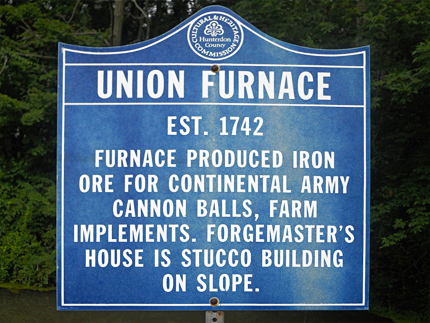
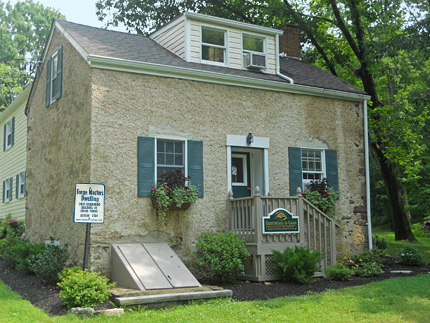
Union Furnace Site Marker
Forge Masters Dwelling (now the office of Generations to Come)
Union Furnace Preserve
Van Syckels Rd.
Map / Directions to the Union Forge Site
Map / Direction to all Clinton Revolutionary War Sites
The Union Iron Works began producing iron at an iron furnace here beginning in 1742. [10] The original owners of the Union Iron Works were William Allen and Joseph Turner. Turner owned a house located several miles west of here in Hampton, which is now a museum.
In the decades before the war, Union Forge produced such items as horseshoes, farm tools, and fireplace backs. With the arrival of the Revolutionary War in 1775, changes came to the Union Forge. To begin with, Allen and Turner were known Loyalists, meaning that they remained loyal to Britain in the war. As such, they were forced to flee from the area.
After Allen and Turner were gone, control of the iron works was placed in the hands of Robert Taylor, who had previously been the company's bookkeeper. Taylor was known to be a supporter of the American cause. With the coming of the war, the ironworks became important to the military effort because of the production of such items as cannon balls and rifle barrels.
It required an enormous amount of heat energy to run the furnace to work with iron. Melting iron to a workable state requires maintaining temperatures over 2000 degrees. To keep the furnaces burning here, an acre of trees was cut down every day to be burned. By 1781, the trees in the surrounding area had been used up, and the furnace here ceased production. Union Iron Works then focused its work on a furnace located two miles to the west in High Bridge.
The only remaining building standing at this site associated with the Union Forge is the house which was used by the forgemaster, who ran the furnace operations. The house actually predates the 1742 establishment of Union Forge: it was built before 1720. The earliest forgemaster to live here was probably Nathaniel Irish. It is now used as an office by Generations to Come at 12 Van Syckels Rd.
Slightly west on Van Syckels Rd. (by Rte. 31) is the entrance to the Union Furnace Preserve, a 97-acre wooded preserve on the area which was once part of the Union Iron Works property.

1. ^ Minutes of a Bethlehem Town Meeting on March 11, 1766, recorded by Bethlehem Township Clerk Francis McShane, as reprinted in:
James P. Snell, History of Hunterdon and Somerset Counties, New Jersey (Philadelphia: Everts & Peck, 1881) Page 459
Available to be read at the Internet Archive here~ A Sons of Liberty group was formed in lower Hunterdon County in early 1766. Residents of the township of Bethlehem met at Reynolds Tavern on March 11, 1766, to choose three delegates to represent them at an upcoming meeting of the Sons of Liberty group at Ringo's Tavern in Ringoes. Abraham Bonnell was chosen one of the three men to attend this meeting.
For more information about those meetings, see the Reynolds Tavern entry on the Hampton page and the Ringo's Tavern entry on the Ringoes page.3. ^ For an interesting article about the functions of New Jersey taverns in the 1700's, see:
Margie Hofer, "A Tavern for the Town: Josiah Halstead's Tavern and Community Life in Eighteenth-Century Shrewsbury" (Freehold, NJ: Monmouth County Historical Association, 1994) Pages 1-84. ^ Minutes of the Provincial Congress and the Council of Safety of the State of New Jersey (Trenton: Naar, Day & Naar, 1879) Pages 183-184
Available to be read at the Internet Archive here~ Other notable Hunterdon County residents are among those listed as attending, including:
• John Hart (Signed the Declaration of Independence. His house and grave are in Hopewell)
• Thomas Lowrey of Flemington (Buried in the Oak Summit Cemetery in Baptistown)
• John Mehelm (George Washington stayed at his house in July 1777. The house is gone, but a sign marks its site in Tewksbury Township)
• Charles Stewart (Served as a militia colonel, then Commissary General of Issues of the Continental Army. His house is in Franklin Township)5. ^ Minutes of the Provincial Congress and the Council of Safety of the State of New Jersey (Trenton: Naar, Day & Naar, 1879) Page 190
Available to be read at the Internet Archive here6. ^ George Scudder Mott, The First Century of Hunterdon County, State of New Jersey (Flemington, NJ; E Vosseller, Bookseller, and Stationer, 1878) Page 32
Available to be read at Google Books here.7. ^ William S. Stryker, Official Register of the Officers and Men of New Jersey in the Revolutionary War (Trenton: Wm. T. Nicholson & Co., 1872) Page 336, 342, 357
Available to be read at Google Books hereMinutes of the Provincial Congress and the Council of Safety of the State of New Jersey (Trenton: Naar, Day & Naar, 1879) Page 565
Available to be read at the Internet Archive here8. ^ Gravestone at Bethlehem Presbyterian Church Cemetery in Pittstown
10. ^ Information for this entry was drawn from:
WiIIiam E. Honachefsky, "Three Hundred Years of Solitude," 2016, Skylands Visitor website
Historical plagues at the Solitude House in High Bridge
Union Furnace Preserve - Trail Map and Guide brochure; County of Hunterdon Department of Parks and Recreation, available as PDF here